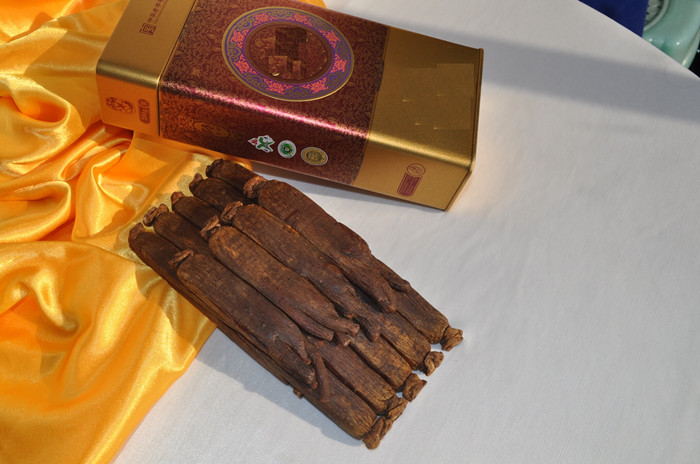Panax Red Ginseng

INTRUDUCTION
Traditionally, red ginseng, also known as
Panax ginseng, has been taken as an aphrodisiac, as a stimulant and to increase
longevity. Used in China as a treatment for diabetes and male sexual
dysfunction, ginseng root has been a highly prized herb for thousands of years.
Although a widely used and highly regarded medicinal agent when used
appropriately, there are concerns about the wide range of side effects and drug
interactions from the long-term use of the ginseng plant for more than three
months. It is generally well tolerated, but caution should be taken when
consuming any herbal medicine.
USES
Alzheimer’s disease. Evidence shows that
taking Panax ginseng root daily for 12 weeks can improve mental performance in
people with Alzheimer’s disease.
Lung disease called chronic obstructive
pulmonary disease (COPD). Taking Panax ginseng by mouth seems to improve lung
function and some symptoms of COPD.
Mental function. Taking Panax ginseng by
mouth might improve abstract thinking, mental arithmetic skills, and reaction
times in healthy, middle-aged people but not in young adults. Panax ginseng
alone does not seem to improve memory, but there is some evidence that a
combination of Panax ginseng and ginkgo leaf extract can improve memory in
otherwise healthy people between the ages of 38 and 66.
Erectile dysfunction (ED). Taking Panax
ginseng by mouth seems to improve sexual function in men with erectile
dysfunction.
High blood pressure. Early evidence shows
that taking Panax ginseng might slightly decrease blood pressure in people with
high blood pressure.
Premature ejaculation. Applying a cream
containing Panax ginseng, angelica root, Cistanches deserticola, Zanthoxyl
species, torlidis seed, clover flower, asiasari root, cinnamon bark, and toad
venom (SS Cream) to the penis one hour before intercourse and washing off
immediately before intercourse seems to help prevent premature ejaculation
Sexual arousal. Taking powdered Korean red
ginseng, a specific form of Panax ginseng, seems to improve sexual arousal and
satisfaction in postmenopausal women. Also, using a specific product containing
Korean red ginseng and other ingredients (ArginMax) seems to improve sexual
desire in women.
Athletic performance. Taking Panax ginseng
by mouth for up to 8 weeks does not improve exercise performance.
Bad breath. Early evidence suggests that
taking Korean red ginseng, a type of Panax ginseng, daily for 10 weeks helps
reduce bad breath, particularly in people with bad breath caused by
Helicobacter pylori (H. pylori) infection.
Breast cancer. Some studies conducted in
China suggest that some people with breast cancer treated with any form of
ginseng (American or Panax) have a higher quality of life and lower risk of
death. However, this might not be a result of taking the ginseng, because the
people in the study were also more likely to be treated with the prescription
cancer drug tamoxifen. It is difficult to know how much of the benefit to
attribute to ginseng.
Infection of the airways in the lung
(bronchitis). Taking Panax ginseng, combined with antibiotics, might be more
effective in killing bacteria than antibiotic treatment alone.
Cancer. Research suggests that taking
ginseng by mouth might decrease the occurrence of some types of cancer,
including stomach cancer, lung cancer, liver cancer, ovarian cancer, and skin
cancer. Also, early research suggests that taking Panax ginseng (Cultivated
Wild Ginseng Pharmacopuncture) intravenously (by IV) might stop or slow the
progression of lung cancer.
Common cold. There is some evidence that
taking a specific Panax ginseng extract (G115) by mouth can decrease the chance
of catching a cold.
Heart failure. Administering ginseng
intravenously (by IV) seems to improve symptoms of heart failure.
Diabetes. There is inconsistent evidence
about the effects of Panax ginseng on diabetes. Some research shows that taking
Panax ginseng by mouth daily can improve blood sugar levels. However, other
research suggests that taking Panax ginseng (AIPOP, Gangdown-Do, Korea) or
Korean red ginseng extract (Spectrum Laboratories, Gardena, CA) by mouth does
not improve blood sugar levels in people with diabetes.
Fatigue. Early evidence shows that taking a
specific product containing Panax ginseng, vitamins, and minerals (Pharmaton)
might reduce symptoms of fatigue.
HIV. Early evidence shows that Korean red
ginseng, a particular form of Panax ginseng, might increase immune function but
does not affect how much of the HIV virus is circulating in the blood of people
with HIV
Prediabetes. Taking a combination of Korean
red ginseng and cheonggukjang, a type of fermented soybean paste, can reduce
blood sugar levels in people with prediabetes.
Influenza. There is some evidence that
taking a specific Panax ginseng extract (G115) by mouth beginning 4 weeks
before a flu shot and continuing for 8 weeks after can decrease the risk of
getting the flu.
Memory. Taking a specific Panax ginseng
extract (G115) together with vitamins, minerals and dimethylaminoethanol
bitartrate might improve memory in older people with memory problems.
Postmenopausal conditions. Some early
research suggests that Panax ginseng might improve quality of life and
menopausal symptoms, such as fatigue, insomnia, and depression in
postmenopausal women. However, Panax ginseng does not appear to reduce hot flashes.
Quality of life. While some research
suggests that Panax ginseng might improve quality of life, other research shows
no benefit.
Wrinkled skin. Early research shows that
taking a combination of Korean red ginseng root with Torilus fructus and Corni
fructus daily for 24 weeks might reduce wrinkles, but does not appear to affect
skin moisture, elasticity, thickness, or color.
Depression.
Anemia.
Fluid retention.
Stomach inflammation and other digestive
problems.
Chronic fatigue syndrome (CFS) .
Fibromyalgia.
Fever.
Other conditions.